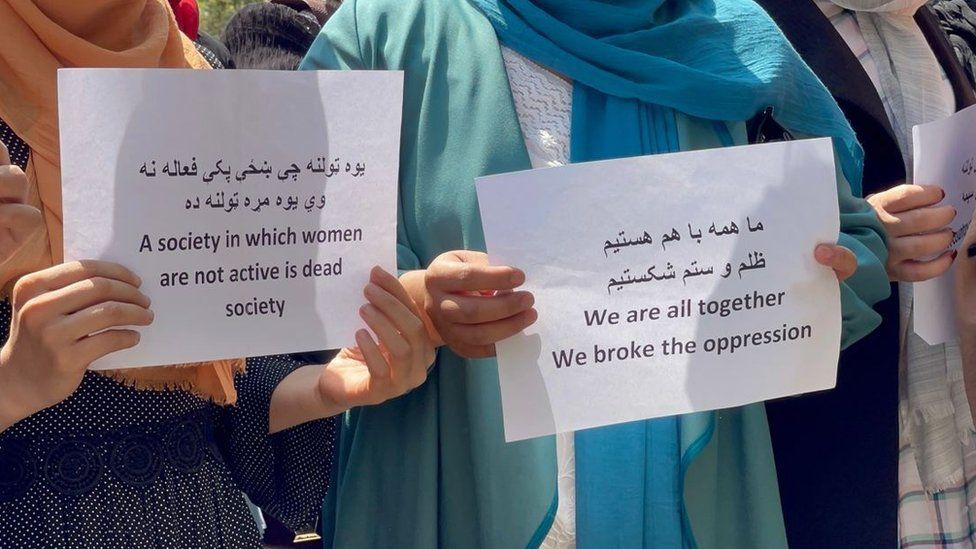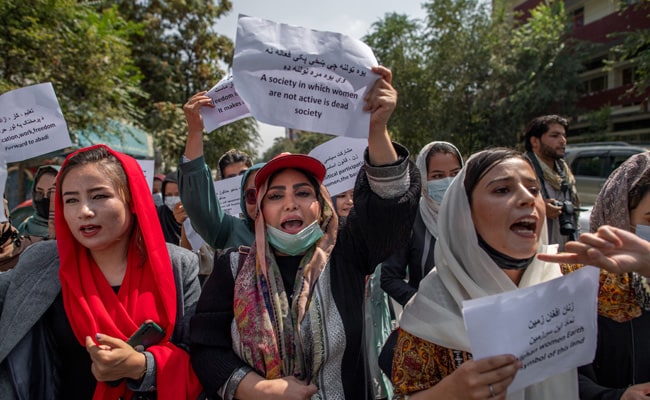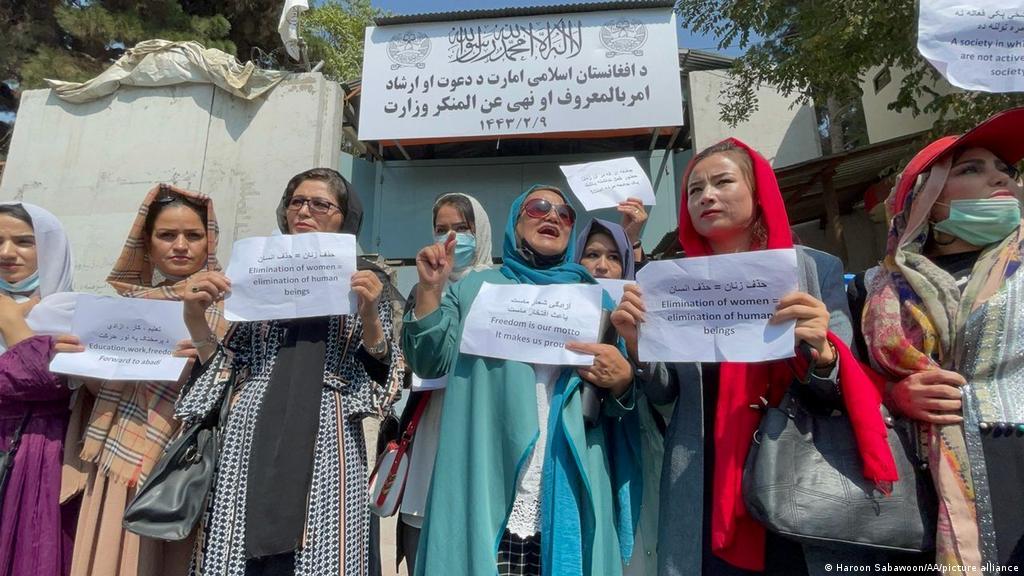By Jamie Wilson

Some women held a protest in Kabul against the restrictions they are facing. (AFP photo)
Female employees in the Kabul city government have been told to stay home, with work only allowed for those who cannot be replaced by men, the interim mayor of Afghanistan’s capital said on Sunday, detailing the latest restrictions on women by the new Taliban rulers.
The decision to prevent most female city workers from returning to their jobs is another sign that the Taliban, who overran Kabul last month, are enforcing their harsh interpretation of Islam despite initial promises by some that they would be tolerant and inclusive. Under their previous rule in the 1990s, the Taliban barred girls and women from schools, jobs and public life.

A society in which women are not active is a death society.
Witnesses, meanwhile, said an explosion targeted a Taliban vehicle in the eastern provincial city of Jalalabad, and hospital officials said five people were killed in the second such deadly blast in as many days in the Islamic State stronghold.
In recent days the new Taliban government has issued several decrees rolling back the rights of girls and women. It told female middle and high school students that they could not return to class for the time being, while boys in those grades resumed studies this weekend. Female university students were informed that studies would take place in gender-segregated settings from now on, and that they must abide by a strict Islamic dress code. Under the US-backed government deposed by the Taliban, university studies had been co-ed for the most part.
On Friday the Taliban shut down the women’s affairs ministry, replacing it with a ministry for the “propagation of virtue and the prevention of vice” tasked with enforcing Islamic law.
On Sunday just over a dozen women staged a protest outside the ministry, holding up signs calling for the participation of women in public life. “A society in which women are not active is [sic] dead society,” one sign read.
“Why are they taking our rights?” said one of the protesters, 30-year-old Basira Tawana. “We are here for our rights and the rights of our daughters.”
The protest lasted about 10 minutes. After a short verbal confrontation with a man, the women got into cars and left, as Taliban in two cars observed from nearby. Over the past months, Taliban fighters have broken up several women’s protests by force.
Elsewhere in the city, the interim Kabul mayor, Hamdullah Namony, gave his first news conference since being appointed by the Taliban. He said that before the Taliban takeover last month, just under one-third of close to 3,000 city employees were women, and that they worked in all departments.

when we are all togahter we can broke the oppression.
Namony said the female employees have been ordered to stay home pending a further decision. He said exceptions had been made for women who could not be replaced by men, including some in the design and engineering departments and the attendants of public toilets for women. Namony did not say how many female employees were being forced to stay home.
“There are some areas that men can’t do it, we have to ask our female staff to fulfil their duties, there is no alternative for it,” he said.
Namony also said the new government had begun removing security barriers in Kabul, a city that has endured frequent bombing and shooting attacks over the years. Such barriers – erected near ministries, embassies and private homes of politicians and warlords – had been commonplace in Kabul for years.
The mayor said private citizens would be charged for the work of taking down the barriers. While he said most barriers had been removed, reporters touring the city noted that barriers outside most government installations and embassies had been left in place.
The Taliban have tried to present themselves as guarantors of security, in the hope that this will win them support from a public still widely suspicious of their intentions. Under the previous government, a rise in crime had been a significant concern for ordinary Afghans.
The explosion Sunday in Jalalabad was the second attack in two days to target the Taliban in the Islamic State group stronghold. The Taliban and IS extremists are enemies and fought each other even before the Taliban seized control of Afghanistan last month.
Hospital officials in Jalalabad said they received the bodies of five people killed in the explosion. Among the dead were two civilians, including a child, and three others who according to witnesses were in a targeted border police vehicle and were believed to be Taliban.
On Saturday, three explosions targeted Taliban vehicles in Jalalabad, killing three people and wounding 20, witnesses said. There was no immediate claim of responsibility.

Afghan women hold banners and taped their mouths as they gather to stage "silent protest" for their education rights at the entrance of the shopping mall opposite the Ministry of Education, in Kabul, Afghanistan on September 19, 2021. (Bilal Guler - Anadolu Agency)



